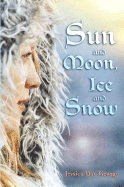

As the ninth child of a poor woodcutter, the "lass" at the center of this story is so resented by her mother that the woman will not name her. One day, the lass goes in search of the legendary white reindeer, purportedly spotted in the woods near the woodcutter's home. When she finds the creature tangled in brambles, she sets him free; in return he gives her a name, which she dares tell no one. Soon she discovers she can communicate with animals. Even youngest readers may recognize the parallels to Beauty and the Beast, when a giant white bear comes to the woodcutter's cottage, and the lass's mother agrees to let the girl go in exchange for the promise of wealth.
Once again George creates a gutsy, resourceful heroine, akin to Creel in her first novel. The lass, true to her word, accompanies the white bear to an ice palace, with the intention of fulfilling her promise to remain there for a year--even when a mysterious man comes to her room each evening. But like Psyche, the lass's sister plants a seed of doubt, and the lass discovers the identity of her midnight visitor, thereby setting in motion a chain of reactions that ultimately leads her to an even greater palace east of the sun and west of the moon. The author literally fleshes out the tale by appealing to the five senses. The lass's wolf-dog, Rollo, reports that the ice palace smells of rotting flesh. The descriptions of the luxurious meals, the textures of the silk gowns, all contribute to a sensory experience. The tale cautions against vanity, often with humor (like Nancy Farmer's evil half-troll Queen Frith in The Sea of Trolls, the princess troll here also loses her hair, but in a comical climactic scene), and implies the long cycle of ungranted wishes for the insatiable troll princess (a nicely crafted scene with three elderly "mosters," or aunties, amplifies this theme). Even if readers think they know where the author is leading them, they will be in for some pleasant surprises.--Jennifer M. Brown

